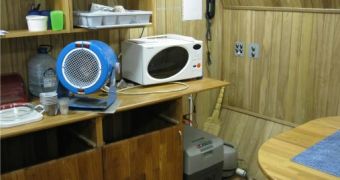Early tomorrow, the hatches will close on the international Mars 500 experiment, a test designed to evaluate the effects of long-term isolation on the human mind. The six “astronauts” aboard the bogus spaceship, two from Europe and four from Russia, will remain locked inside the metal containers at the Institute of Biomedical Problems (IBMP) in Moscow for 105 days, during which time their actions and interactions will be closely monitored.
Among the most important things that this somewhat cruel scientific experiment is trying to assess, experts have mentioned the effects of sunlight deprivation, as well as the influence of seclusion on the participants' mood, sleep patterns, health and psychological health. Disturbances or coordination in their hormone production will also be carefully analyzed.
The reason why these measures are so drastic is a very simple one – a real crew to Mars will have to survive at least one and a half years together in the vastness of space, without going insane and killing each other. At currently available speeds, experts estimate that it would take in the vicinity of six months for a spacecraft carrying six astronauts to reach the Red Planet, with roughly the same amount of time being necessary for it to return.
Between trips, the crew will have to endure the harsh conditions on Mars and to be able to fully cooperate, so as to prevent any accidents or incidents. For this objective to be achieved, the six crew members will have to be completely sane and able to withstand such a perilous journey without losing their senses. If Mars 500 works, then another similar experiment will be set up, in which another fake astronaut crew will be kept in isolation for more than 500 days, the estimated time of a there-and-back trip to our neighboring planet.
“The evacuation of individual members of the crew due to illness or personal wish is comparable to the 'death' of the cosmonaut,” a press release from the IBMP states. “The crew will themselves resolve all problems and uncomfortable situations which do not require the evacuation of crew members.”
“During the study, I look forward to observing how communications develop and how relationships are established between crew members. I expect that each of us will feel both highs and lows, mentally, physically and socially,” Frenchman Cyrille Fournier, a 40-year-old pilot who will enter the capsule tomorrow with his five colleagues, says on the European Space Agency's website.

 14 DAY TRIAL //
14 DAY TRIAL //